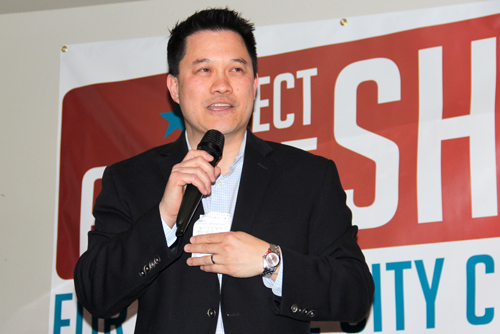By Assunta Ng

Albert Shen at his campaign kick-off event on May 1, where he raised over $75,000. (Photo from Albert Shen)
Albert Shen or May Day?
For decades, every Wednesday night has been thrilling, agonizing, exhausting, and — sometimes — even hysterical and nightmarish. But if you check my calendar, you would be surprised — very few events are ever listed on Wednesdays. On Wednesdays, I have a date with my newspapers, and that’s the truth.
Wednesday night has always been the most intense time of the week — not only for me, but also for the entire Northwest Asian Weekly/Seattle Chinese Post staff. We print Wednesday nights, but don’t ask us what time we finish. We can never be sure. We finish when we’re done, whether that’s 7 p.m., 8 p.m., 9 p.m., or even 11 p.m.
As publisher, I am literally chained to the office. We make vital decisions that can produce either great success or great failure. If I want to attend an event, I usually plan ahead and alert my staff.
That almost happened last Wednesday, when Albert Shen hosted his campaign kick-off for Seattle City Council. I told him that I’d be there, but little did I know something else was going to happen. The annual May Day parade passed through the International District on South King St.
“Change the front pages,” I told my staff around 5 p.m. The story was not something we could have saved for next week. The adjustments instantly changed the look, structure, and layout of each paper. One of our staff members, Rebecca Ip, took an incredible photo. The changes also meant that our editors had to focus on the development of the protest, staying late and making space for an additional story.
“Whoa, do we have to do that? We have to stay late?” No one in my office said that.
When a second march made up of anarchists joined the crowd downtown, the protest turned ugly.
Over dinner, our conversation centered on finalizing the story, “How many people got injured? How many arrested?”
“Did the police use smoke bombs or grenades?
“Is the headline accurate?”
Never on Wednesday
Over the last few decades, dedicating Wednesday nights to the papers has been our way of life.
My staff sacrifices many things for the papers. We don’t celebrate birthdays on Wednesdays, we don’t get sick — I am not kidding, I get sick on weekends and never on Wednesday — we know how to condition our minds and bodies to work long and hard on Wednesdays without fail. One of my staff members quietly charmed her unborn baby to be delivered on a Saturday, her version of why her baby cooperated.
During those hours, we learn to say no to all temptations, and we show you our commitment and passion toward journalism and the community.
But last Wednesday wasn’t a disaster at all. It actually went very smoothly. I can share with you a real nightmare.
“Help!” said my editor at 6 p.m. a few years ago. “We need a front page story, I can’t find anything.”
But even that was not as grueling as it sounded, because we still finished the papers before 9 p.m. What an improvement compared to my early days, when I couldn’t leave the office before 3 a.m. on Thursday and still had to deliver the layout to the printer before heading back home.
And imagine three decades ago when we still processed photos in the dark room. Today, I don’t complain. Digital media has made our lives much easier. All my staff needs to do now is to press a few buttons and all the files are sent to the printer.
I am proud that my staff, though small, can respond to changes so quickly, efficiently, and effectively.
Over the past 20 years, I have bought lots of pastries and sandwiches on Wednesday afternoons for my staff, knowing that it could be a tough battle to work with a growling stomach.
One reader sent us an email after reading our papers this past Thursday.
“You did a good job, Asian Weekly and Chinese Post are just like daily newspapers.”
Glad you noticed.
As for Shen, he has no problem with me not showing up. He understands the life of a journalist is frequently dictated by the news.
The best party is yet to come for Shen, and I will be there for that one. But remember, Albert, don’t host it on a Wednesday. (end)



